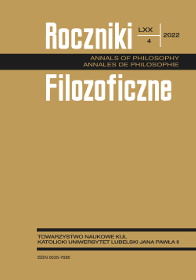Pluralism is not Enough for Tolerance. Philosophical and Psychological Reflections on Pluralism and Tolerance
Abstract
The issue of religious tolerance is increasingly raised in a globalized world with societies becoming more and more religiously diverse and inhomogeneous. Religious tolerance can be defined as the practice of accepting others as acting in accordance with their religious belief system. Philosophers have recently begun to study more thoroughly the relationship between religious pluralism and religious (in)tolerance with a main focus on the epistemic question of whether the recognition of and reflection on religious pluralism might lead to greater religious tolerance. The major thrust of this idea is that any genuine reflection of a person about her epistemic peers adhering to other religions will weaken the person’s epistemic justificatory basis for believing that her own religious beliefs are better warranted than the religious beliefs of her peers.
The rational consequence of the recognition of this justificatory fact, in turn, should lead to more religious tolerance and to a weakened dismissive attitude towards adherents of other religions. The main aim of this paper is to investigate the plausibility of this account against the background of existing empirical, in particular psychological literature: Does increased contact with adherents of other religious traditions indeed lead to more tolerance? How are we able to show a deeper understanding for people with different religious beliefs and to take on—at least partially—their perspective? What are potential psychological obstacles to these achievements? Resources from research on intergroup toleration, social identity-theories, developmental psychology and personality traits will be used for tackling these questions. This shall help to broaden the so far rather narrow epistemic philosophical perspective on religious pluralism and (in)tolerance by embedding it into the larger context of constitutive traits of the human psyche.
References
Alston, William P. 1988. “Religious Diversity and Perceptual Knowledge of God.” Faith and Philosophy 5:433–48.
Beck, Richard. 2006. “Defensive Versus Existential Religion: Is Religious Defensiveness Predictive of World-View Defense?” Journal of Psychology and Theology 34: 143–53.
Brambilla, Marco, Patrice Rusconi, Simona Sacchi, and Paolo Cherubini. 2011. “Looking for Honesty: The Primary Role of Morality (vs. Sociability and Competence) in Information Gathering.” European Journal of Social Psychology 41(2): 135–43. https://doi.org/10.1002/ejsp.744.
Byrne, Peter. 2011. “Religious Tolerance, Diversity, and Pluralism.” Royal Institute of Philosophy Supplement 68:287–309. https://doi.org/10.1017/S1358246111000014.
Dawkins, Richard. 1995. River out of Eden. A Darwinian View of Life. New York: Basic Books.
Faust, Jennifer. 2008. “Can Religious Arguments Persuade?” International Journal for Philosophy of Religion 63:71–86.
Goodwin, Geoffrey P., Jared Piazza, and Paul Rozin. 2014. “Moral Character Predominates in Person Perception and Evaluation.” Journal of Personality and Social Psychology 106(1): 148–68. https://doi.org/10.1037/a0034726.
Hardcastle, Valerie. 1996. “The Why of Consciousness: An Non-Issue for Materialists.” Journal of Consciousness Studies 3(1): 495–513.
Haidt, Jonathan, and Sara B. Algoe. 2004. “Moral Amplification and the Emotions That Attach Us to Saints and Demons.” In Handbook of Experimental Existential Psychology, edited by Jeff Greenberg, Sander Koole, and Tom Pyszczynski, 322–35. New York: Guilford Press.
Hogg, Michael A., Janice R. Adelman, Robert D. Blagg. 2010. “Religion in the Face of Uncertainty: An Uncertainty–Identity Theory Account of Religiousness.” Personality and Social Psychology Review 14(1): 72–83. https://doi.org/10.1177/1088868309349692.
Hook, Joshua N., Jennifer E. Farrell, Kathryn A. Johnson, Daryl R. van Tongeren, Don E. Davis, and Jamie D. Aten. 2017. “Intellectual Humility and Religious Tolerance.” The Journal of Positive Psychology 12(1): 29–35. https://doi.org/10.1080/17439760.2016.1167937.
Jonas, Eva, and Peter Fischer. 2006. “Terror Management and Religion: Evidence that Intrinsic Religiousness Mitigates World-View Defense Following Mortality Salience.” Journal of Personality and Social Psychology 91(3): 553–67. https://doi.org/10.1037/0022-3514.91.3.553.
Jones, Michael S. 2015. “Does Cognitive Humility Lead to Religious Tolerance? Reflections on Craig versus Quinn.” International Journal for Philosophy of Religion 78:73–89.
Liquin, Emily G., Emlen S. Metz, Tania Lombrozo. 2020. “Science Demands Explanation, Religion Tolerates Mystery.” Cognition 204:104398. https://doi.org/10.1016/j.cognition.2020.104398.
Löffler, Winfried. 2013. Einführung in die Religionsphilosophie. 3rd ed. Darmstadt: Wissenschaftliche Buchgesellschaft.
Plantinga, Alvin. 2000. Warranted Christian Belief. Oxford: Oxford University Press.
Pyszczynski, Tom, Jeff Greenberg, and Sheldon Solomon. 1997. “Why Do We Need What We Need? A Terror Management Perspective on the Roots of Human Social Motivation.” Psychological Inquiry 8(1): 1–20.
Quinn, Philip L. 2001. “Religious Diversity and Religious Toleration.” International Journal for Philosophy of Religion 50: 57–80.
Quinn, Philip L. 2005. “On Religious Diversity and Tolerance.” Daedalus, Winter: 136–39.
Ratcliffe, Matthew. 2020. “Existential Feelings.” In The Routledge Handbook of Phenomenology of Emotion, edited by Thomas Szanto and Hilge Landweer, 250–61. Abington: Routledge.
Riordan, Patrick. 1994. “Religion as Weltanschauung: A Solution to a Problem in the Philosophy of Religion.” Aquinas 34:519–34.
Steger, Michael F., Natalie K. Pickering, Erica Adams, Jennifer Burnett, Joo Yeon Shin, Bryan J. Dik, and Nick Stauner. 2010. “The Quest for Meaning: Religious Affiliation Differences in the Correlates of Religious Quest and Search for Meaning in Life.” Psychology of Religion and Spirituality 2(4): 206–26. https://doi.org/10.1037/a0019122.
Vail, Kenneth E., Zachary K. Rothschild, Dave R. Weise, Sheldon Solomon, Tom Pyszczynski, and Jeff Greenberg. 2010. “A Terror Management Analysis of the Psychological Functions of Religion.” Personality and Social Psychology Review 14(1): 84–94. https://doi.org/10.1177/1088868309351165.
Van Tongeren, Daryl R., Jennifer M. Raad, Daniel N. McIntosh, and Jessica Pae. 2013. “The Existential Function of Intrinsic Religiousness: Moderation of Effects of Priming Religion on Intercultural Tolerance and Afterlife Anxiety.” Journal for the Scientific Study of Religion 52(3): 508–23.
Van Tongeren, Daryl R., Hakim Sabrina, Joshua N. Hook, Kathryn A. Johnson, Jeffrey D. Green, Timothy L. Hulsey, and Don E. Davis. 2016. “Toward an Understanding of Religious Tolerance: Quest Religiousness and Positive Attitudes Toward Religiously Dissimilar Others.” The International Journal for the Psychology of Religion 26(3): 212–24. https://doi.org/10.1080/10508619.2015.1039417.
Wolterstorff, Nicholas. 1996. John Locke and the Ethics of Belief. Cambridge: Cambridge University Press.
Copyright (c) 2022 Roczniki Filozoficzne

This work is licensed under a Creative Commons Attribution-NonCommercial-NoDerivatives 4.0 International License.





